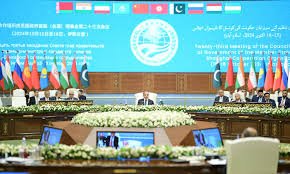Mir Sher Baz Khetran
The Shanghai Cooperation Organization (SCO) stands as one of the most influential geopolitical alliances in the world today, fostering peace, stability, and prosperity across its member states.
It acts as a crucial platform for regional cooperation, addressing issues ranging from economic development to security and climate action.
The recent 23rd meeting of the SCO Council of Heads of Government (CHG) held in Islamabad on October 15-16, 2024, marked a significant diplomatic moment. The SCO meetings sought to explore ways to enhance regional economic integration through trade and connectivity within the Eurasian political and security bloc.
Additionally, all the member states pledged to offer their services for working on eradicating poverty while promoting prosperity and sustainable development in the region.
Enhancing Diplomatic and Economic Ties
This year’s SCO summit in Islamabad was of particular significance. SCO member states collectively account for over $20 trillion in GDP, representing approximately 30% of the global economy.
Intra-SCO trade has been growing steadily, with a 12% annual increase, highlighting the organization’s economic vitality. Despite India’s opposition, adopting BRI remains a key aspect of the SCO’s regional strategy.
Gwadar Port provides access to the Arabian Sea and is a critical infrastructure node, particularly for landlocked Central Asian states seeking broader trade access, stressing the importance of expanding regional connectivity and developing energy projects like the Turkmenistan-Afghanistan-Pakistan (TAP) pipeline.
This underscores Pakistan’s potential to become a linchpin in regional economic integration.
The SCO members are committed to enhancing transport links, including railway systems and port infrastructure, as crucial drivers of economic growth.
The summit saw renewed calls for increased use of local currencies for trade transactions, reducing reliance on the US dollar and Euro.
This move is seen as a way to minimize exposure to currency fluctuations and transaction fees, fostering economic cooperation among SCO members.
SCO’s Global Influence and Regional Dynamics
The SCO’s influence on the global stage is growing, both as an economic bloc and a security alliance. With eight full members, including two major global powers—China and Russia—the organization has positioned itself as a counterbalance to Western alliances like NATO.
However, the SCO’s mission extends beyond merely challenging the West; it seeks to offer an alternative model of multilateralism rooted in regional cooperation, non-interference, and mutual respect.
Including observer states and dialogue partners, such as Turkey, Iran, and Belarus adds further complexity to the SCO’s regional and global dynamics.
As the organisation expands, its reach across key sectors, including energy, technology, and counterterrorism, continues to grow, making it a critical player in shaping the geopolitical and economic landscape of Eurasia.
After the two-day summit, a joint statement was issued in which the heads of delegations advocated for sustainable and inclusive economic growth of member states by optimizing the region’s potential in areas such as: green development, digital economy, trade, e-commerce, Finance and banking, Investment, High technology, start-ups and innovation, Poverty alleviation, Health care (including traditional and folk medicine), agriculture, Industry, Transport, Logistics connectivity, Energy (including renewable energy), communications, Science and Technology, Environment and climate change.
Climate Action and Environmental Cooperation
One of the most pressing challenges for the entire region is climate change. Despite contributing minimally to global greenhouse gas emissions, Pakistan remains one of the world’s most climate-vulnerable nations.
The SCO summit provided Pakistan with a platform to advocate for greater regional collaboration on climate resilience and sustainable development.
Pakistan pushed for climate financing frameworks that would enable developing nations to better cope with environmental crises.
China, in turn, proposed deepening cooperation in green development, with a focus on renewable energy and sustainable technologies.
Addressing Security Concerns and Afghanistan’s Future
Regional security was another cornerstone of the discussions. Afghanistan, which shares borders with several SCO member states, remains a focal point of concern due to its ongoing instability.
The Islamabad summit reinforced the SCO’s commitment to ensuring that Afghan territory is not used for terrorist activities.
Premier Li Qiang and other leaders echoed Pakistan’s longstanding call for a stable and peaceful Afghanistan, which is crucial for broader regional security and economic growth.
Pakistan, with its extensive experience in counterterrorism, plays an instrumental role in the SCO’s Regional Anti-Terrorism Structure (RATS), providing expertise in combating extremism and terrorism.
As Afghanistan’s situation continues to evolve, the SCO’s coordinated approach to security will be critical in stabilizing the region.
Pakistan’s leadership in this realm not only bolsters its own security but also strengthens the collective resilience of the entire SCO region. SCO member states have conducted numerous joint military exercises since 2003 and in 2018, Pakistan and India participated in their first SCO war games to eliminate simulated terrorist threats.
Challenges and the Road Ahead
The summit provided a valuable opportunity for SCO member countries to showcase its regional leadership, expand their diplomatic outreach, and strengthen their economic and security ties with key regional players.
The path forward will require careful diplomacy and strategic foresight, to navigate its role in a rapidly shifting global order.
As the SCO continues to expand its influence, member China’s role within the organization will be crucial in shaping the future of regional and global collaboration.
The challenge now lies in ensuring that member countries can harness these opportunities while addressing their domestic issues and navigating complex international relationships.
*The writer is a Research Fellow at the Institute of Strategic Studies, Islamabad
*The views expressed are the writer’s own and do not necessarily represent those of the institution.
The Diplomatic Insight is a digital and print magazine focusing on diplomacy, defense, and development publishing since 2009.



